
Miss Betty Grable Steps Out
Just outside Barstow, California, a sleek streamlined train called the Super Chief made its brief stop after picking its way slowly through the Los Angeles slums and suburbs. Here, this de luxe train with a cargo of business tycoons and show world celebrities takes on ice and provisions for its swift dash across the Mojave desert. Inside, insulated against the withering heat, Betty Grable fell back luxuriously on the, great sea-green cushions and exclaimed, “Think of it! Nobody to disturb us for the next thirty-five hours. Harry, what a blessing! The telephone won’t ring an even once!”
No? On the heels of Betty’s happy statement came a loud prolonged beep! It was the compartment door buzzer.
“That’s something we’d. better have disconnected,” Harry James suggested, answering the summons.
“Telegram for Mrs. James,” a grinning porter announced.
Into the outstretched hand, Harry dropped his usual oversize tip and closed the door. He dropped the Western Union message on Betty’s tummy.
“I don’t even want to look,” Betty said, keeping her eyes closed.
“You’d better,” Harry advised. “It could be important.”
“Nothing,” Betty intoned, sleepily, “could be more important than you.”
“Than me. And the kids?” Harry asked.
Betty Grable sat bolt upright, clutching the yellow envelope and tearing it open. Wordlessly she scanned the message. She snatched a newspaper, folded it neatly, stood up, took two steps to the window where her husband Harry sat, watching the landscape run by. Taking a crisp stance, she whacked her beloved firmly on the head with the morning’s final edition of the Los Angeles Times.
“My dear wife,” Harry asked groggily, “What was that for?”
“For horses,” dear wife Betty retorted. “Horses which do not send telegrams.”
“Let me look at that!” Harry grabbed the telegram and read aloud: “Dear Betty. Sorry you two couldn’t make good in Hollywood. But next time you stop by a race track look me up. I’ll cop you a fortune. Signed James Session.
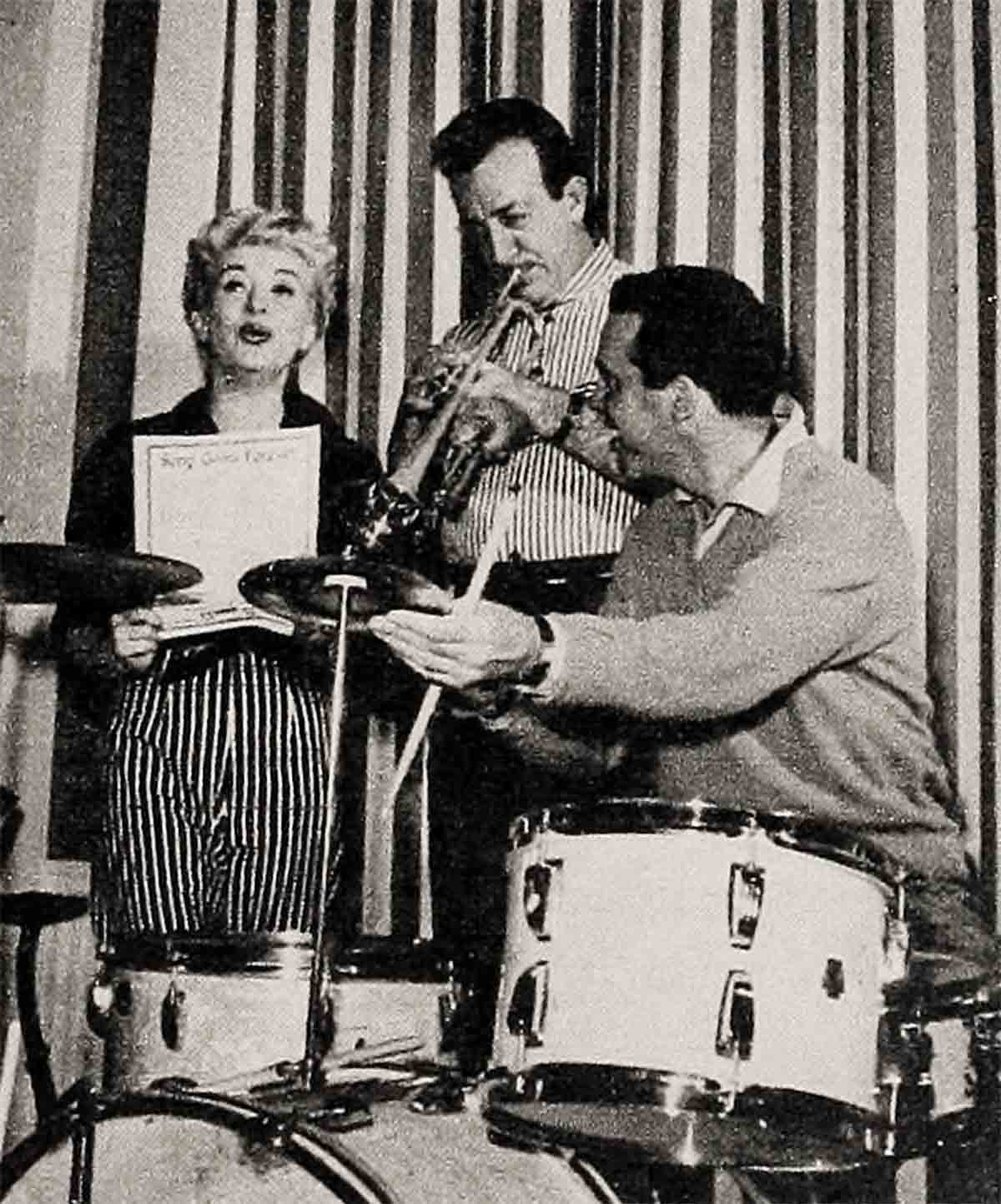
“Well, bless his happy heart!” he laughed. “Good old James Session. Good old horse. Isn’t it wonderful to have somebody in the family with talent!”
You know the story. You know that after ten years of helping to make 20th Century-Fox into a kind of mint, Betty Grable was what is known as an “ex-movie star.” In this capacity she has not enjoyed the good wishes of producers, columnists, writers and hangers-on. She seemed to be that unforgiveable Hollywood commodity, “a has-been.” And that’s the one thing no one in Hollywood wants any part of. How did it happen to Betty?
Was she, perhaps, borne screaming and kicking from the gates of her studio? Did she demand a pension, an annuity? Was she, before the eyes of the world, thrust out into the California snow? Well, no.
“I figured it was time to leave the studio. I had wonderful years there, but I don’t think it’s smart to stay with any one studio for more than ten years. Enthusiasm begins to wane and executives lose their excitement about your possibilities every time they see a newcomer.”
So the shoe is on the other foot, is it? It is Miss Grable who heartlessly junked the studio, home of her youth and patron of her career? Well, no.
After a couple of suspensions, accompanied by hints from stockholders that her salary checks were bigger than the studio finance department, Betty amiably but firmly decided she wanted out. And out she got.
Of course, one thing is sure. Any out wants in again. No bargainers, these Hollywood has-beens; they’ll settle for a walk-on in a horse-opera mob scene. And Grade C at that. Take Betty Grable, for example. She’s practically begging.
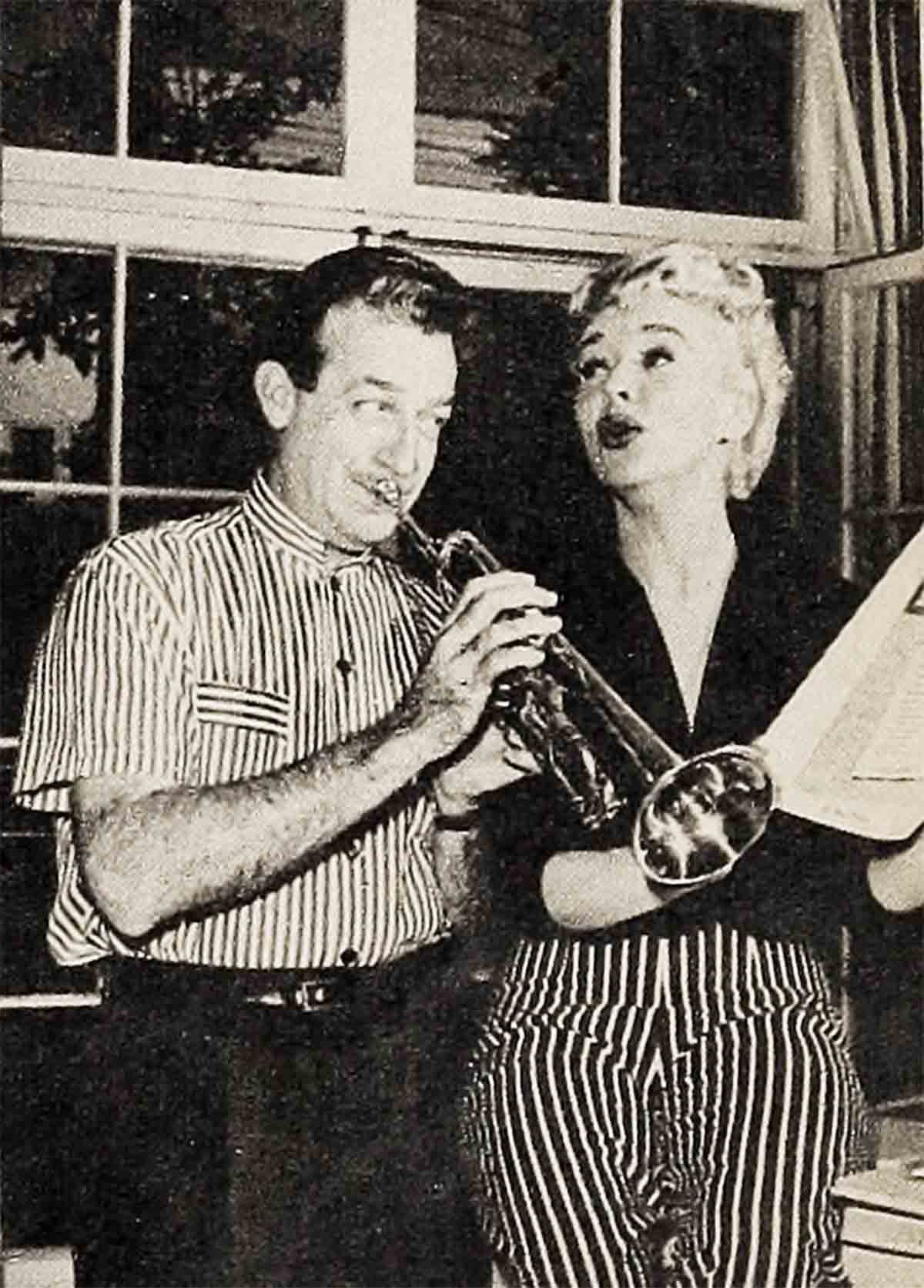
“I won’t sign another studio contract unless I have the right to do outside pictures of my own choosing. I’ll never sign another contract with a “good girl” clause that cuts off the money every time I don’t do exactly what the studio executives have planned. TV? Maybe yes, maybe no; it all depends. I’m the kind of girl who never plans her career. I just let nature take its course.”
But what next? What if the tour is a flop? What will that mean to a changing career? What will it mean to a marriage? And when the register has been signed in Chicago’s famous Ambassador East Hotel, does the confidence of many years’ success fade before the nervousness of an all-important debut?
Those are questions only this long shot can answer. In the Chicago Theatre the big house went dark. Standing in a shimmering sequin version of her famous, fabulous bathing suit pinup costume, Betty shivered a little from the backstage chill.
Suddenly, the fanfare. The curtains inched apart. There was a hush. A seemingly endless hush before the great audience broke into a storm of applause, and backstage a husky musician’s voice was heard, “Man, ain’t she the end? The ever livin’, ever-lastin’ end!”
Well, he said it. He said it not only for the audience, but for the kids at home and the anxious friends in Hollywood. He said it for the mob of fans who crammed into the alley outside the Chicago Theatre chanting “We want Grable! We want Grable!” Some has-been!
He said it, too, for the audience out front. They broke into quick little rashes of applause during Betty’s “Honey Man” number. “Let’s give ’em the tickles, Harry,” she stage-whispered as she danced around the stage looking into the faces of her dancing partners in search of her “honey man.” Then, sotto voce, she let the audience in on the byplay. With each rhythmic swing of her slim hips, Harry played hot little rills and burbles on the trumpet. Betty, with a meaningful look at the far reaches of the balcony murmured, “Talk to me, daddy boy. Listen to that, my daddy’s talkin’, talkin’ to me.”
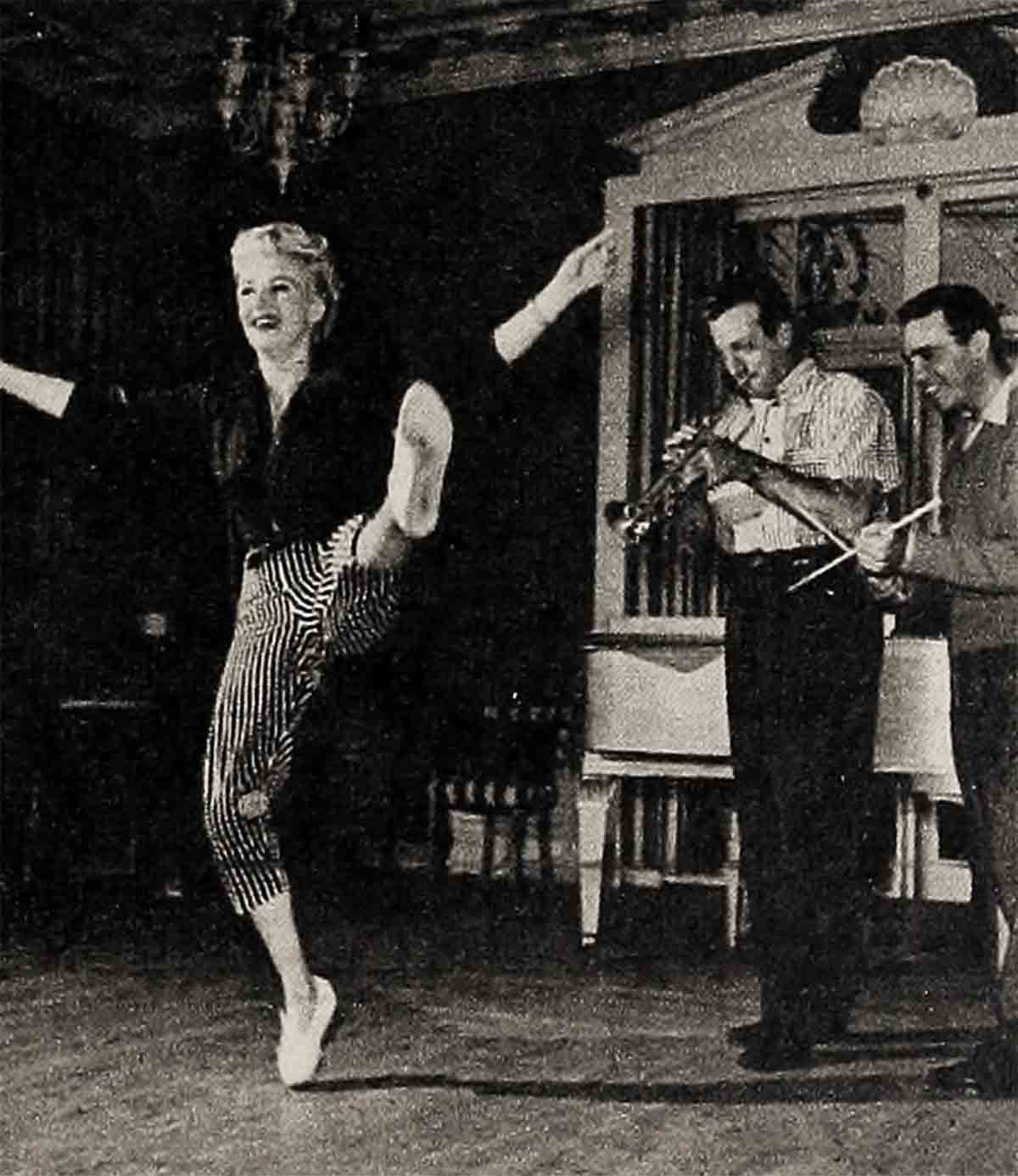
No doubt about it, when Betty finally ran off the stage and into the arms of Harry, she had completely captivated the toughest of critics and tamed an audience famous for being hardboiled. An audience so callous that entertainers have been all but driven from the stage by a rain of pennies. One unfortunate performer nearly fainted when someone tossed an iron bolt. He ducked and the deadly missile sailed right through a big bass drum.
But Betty wasn’t having any of this trouble. The reason is simple enough. Most big-time stars on personal appearance tours whip up a pleasant little act, then walk on stage with every posture implying, “Ah, you lucky peasants to get a close-up look at magnificent me.” If anyone criticizes the act, the star is bewildered. As one of them said, “After all the trouble I went to, leaving Hollywood for this tour, do you mean they expect me to perform?”
The surprise reaction to the Betty Grable-Harry James show both at the Chicago Theatre and afterward at the Michigan Theatre in Detroit was expressed by the Detroit Free Press. “There’s only one thing wrong—it’s too short. From the first note of the famous band leader’s trumpet to the colorful finale, the audience applauded for more.”
Billy Daniel, Betty’s old friend, as well as her dancing partner and director points out that this terrific show just seems short and is designed to leave the audience “hungry.”
“Betty i is responsible for my being in pictures,” Billy says. “After they created this girl they threw away the pattern. She’s trouper all the way through and what show folks call a real pro. This show is a slam bang success because it was rehearsed eight hours a day for four weeks, with both Betty and Harry working themselves to a frazzle, and Harry even composing music to go with the slightest variation in Betty’s dance steps.
“Harry kept pushing Betty along in her rehearsals until she finally protested, ‘Baby you’d better take it a little easy or I’m liable to do el foldo.’ But she didn’t. After the eighth curtain call at one performance she turned to Harry and said, ‘Shall we fuss with another retake, old boy?’ ”
Billy Daniel has known and worked with dozens of stars, but Betty is his idol. “People always ask what it’s like to dance with Betty. All I can say is that when she begins to sing, ‘Put your arms around me, Baby,’ and struts into your vest pocked looking you right in the eye, it’s like takin’ a great big living doll in your arms. You start dancing and you’re all gone, man, all gone.”
You’d think that any man married to girl who generates so much excitement would tend to be a very jealous guy. Not Harry. You don’t have to worry about a wife with Betty’s attitude.
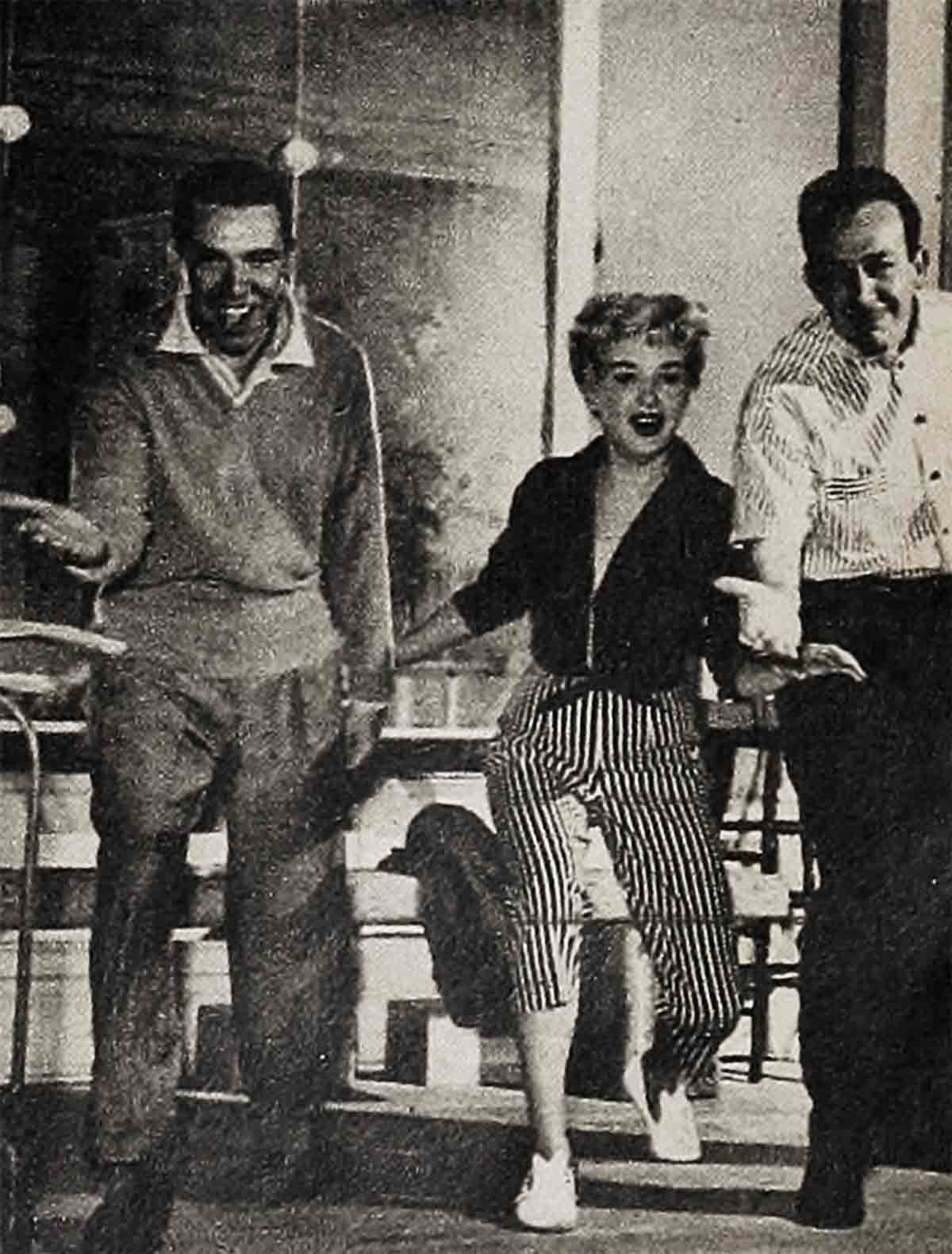
“I don’t know anything about statistics,” she says. “I don’t know if there are more divorces in Hollywood than other places. I don’t read the gossip columns and I couldn’t tell you who isn’t getting along with whom. I wouldn’t tell you if I could. Some stuff you can’t help hearing, and most of that I pay no attention to, because so much of it is wrong. But you do get a little tired of being regarded as a creature with two heads because you’ve got a happy marriage in Hollywood. Lots of picture people are happily married. There’s nothing weird or mysterious about it.
“To me, loving someone means that you want to make him happy. You don’t make a man happy by secretly going ‘out on the town’ when he has to hit the road. You’re not privileged to travel the ‘what’s just a little romance on the side mean?’ road just because you’re a movie star. Marriage demands loyalty and integrity.”
Somehow, it’s the loyalty and integrity in Betty Grable that make her attractive both to dowagers who drive to her shows in Cadillacs and to teen-agers who hitch-hike to see her in person. Betty is living proof that you needn’t indulge in scandal to have a big name. The fact that the Chicago Theatre paid Mr. and Mrs. James a real cool $45,000 for their stand there also proves that clean entertainment can be glamorous and packed with wallop.
Betty Grable knows that loyalty is a two-way street. She insisted on the pin-up pose at opening curtain because, “I want to be the Betty Grable the kids think I am.” The electricians couldn’t believe their eyes when they saw their cue sheets, calling for multiple light changes during Betty’s numbers. One of them said, “Shucks, she’s Grable! She doesn’t need to put everybody to so much work. What’s all this macaroni for? Why not just throw a big white spot on her?”
When he saw the results, though, he exclaimed, “The gal’s right. If she wants to trick it up some more I’ll sit up all night and re-wire the theatre.”
Hollywood is always sending out good will ambassadors to let the public know that it’s a nice town full of good people. Sometimes these ambassadors have created an impression so bad that it would have been better if they’d have stayed home.
The studios ought to take up a collection or Betty’s hep way of making friends and influencing people. In Chicago Betty had to make seven or eight costume changes for each turn, and she had only four or five minutes between numbers. She caught a old and refused to believe that she was on dear nervous exhaustion. She insisted on going out to sign autographs between numbers while she was perspiring heavily and the cold got worse. She was ordered to top it and the stage door was locked. As the orchestra replayed her next cue the was found leaning out the window, sneaking autographs to her fans.
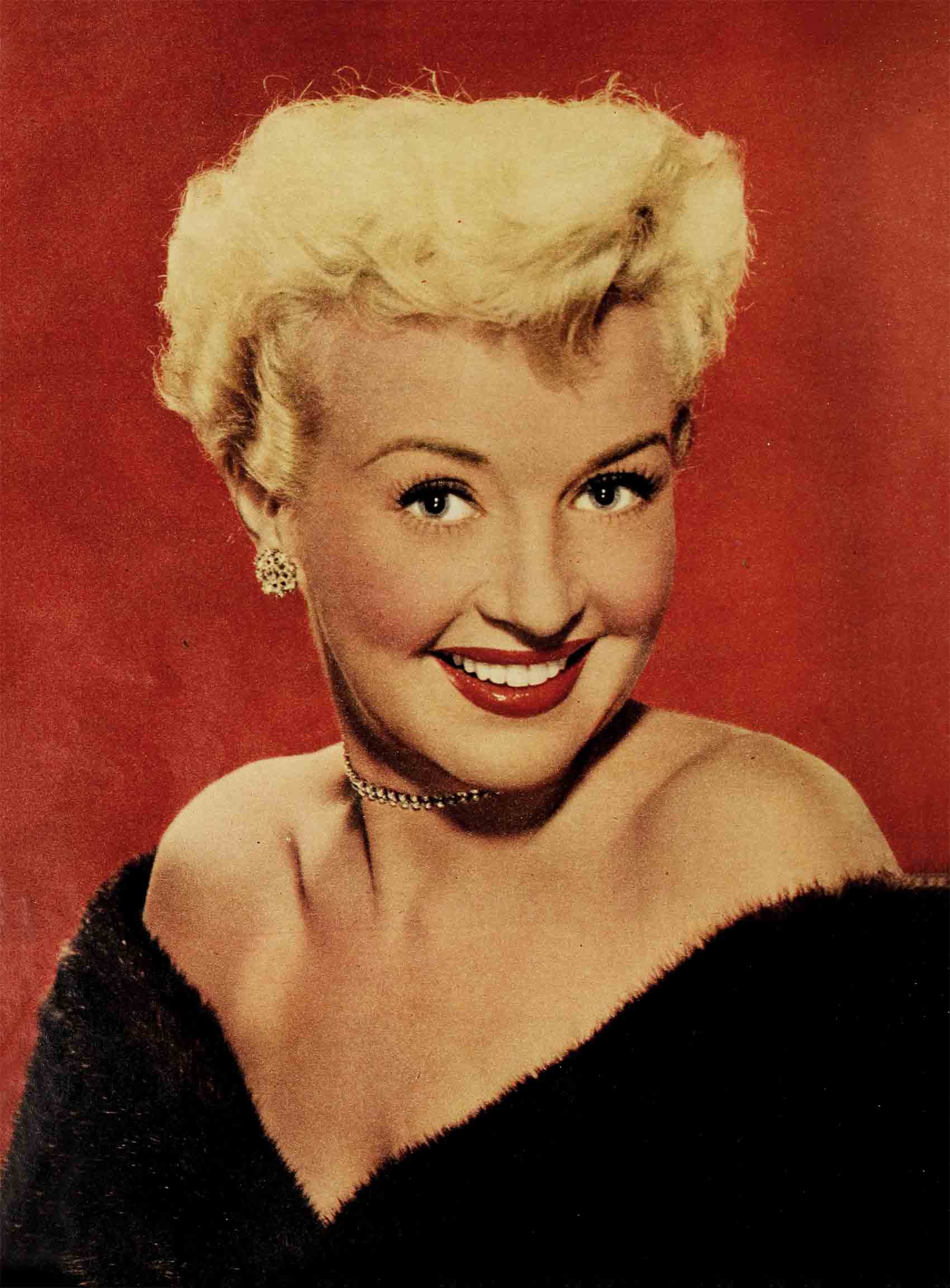
One of her most loyal admirers is a tiny middle-aged lady who has gone to every the of her pictures for years. Betty saw her between acts and accepted a cute pair aprons the lady had made. The two fell a each other’s shoulders and wept.
Betty Grable doesn’t object to anyone’s knowing that she was born December 2, 1916. To find someone with more youthful wallop, you’d have to go look at the ayful colts on the Harry James ranch.
Yet Betty’s youthfulness is no miracle. He doesn’t do it with massage and face. She says she’s lazy and she’s no. To skirt a deep subject, youth seems to have a lot to do with honesty. Betty Grable is honest about her age and herself and her two children, Vickie and Jessica. Hedda Hopper once reported that when she came to interview Betty, Vickie came in and whispered, “Mommy, can I stay here while you talk?”
Betty replied. “You certainly may, honey. You can stay wherever mommy is.”
Hedda went on to relate that she recalled another star whose child wandered in during an interview. The star stalked out of the room, hissing to the nurse the ill-disguised order, “Get that child out of here!” Then she returned and cooed at Hedda; “Isn’t she sweet? Goodbye now, little sweetheart.”
It’s just possible that Betty Grable has no harsh lines in her face because she hasn’t spent her life trying to look and be something she isn’t. Her performance is consistent. When Ted Fio Rito offered her a job, she said to him: “There’s just one thing you ought to know. I can’t sing.”
“Who,” replied Ted, equally honest, “is going to notice?”
After that, Betty suffered a couple of unhappy loves. Then she became Mrs. Harry James and the mother of two daughters. She has retained her earliest fans and the loyalty of her fellow workers.
It’s impossible to report honestly on Betty Grable without telling a lot that is true of no other star, largely because most of them are afraid to be honest with the public. More than a year ago Betty told MODERN SCREEN that she was going to “quit” her studio. Everyone scoffed at that, even those who went backstage in Chicago to say they are sorry they ever let her go. Let her go? They couldn’t hold her.
Then there’s Betty’s mother and father, Lillian and Conn Grable. With many movie stars it takes a private detective to discover the whereabouts of the parents. Although Betty’s parents are divorced, Betty insisted that both come to her opening in Chicago. They were overwhelmed by this evidence of love for them both.
Then, not a few stars avoid being photographed at the race track for fear that their public may resent their interest in the sport of kings. Betty figures that those who love her will allow her the sports and hobbies she likes. Which brings us to the place we came in with this story, for it was on the way back to Hollywood on the Super Chief with Mr. Harry James that Betty burst into their compartment, Daily Racing Form in hand. She shook Harry awake and showed him the paper.
“What’s the matter?” Harry muttered.
“Nothing, honey,” Betty exclaimed, “nothing at all! But maybe you remember the horse that sent me a telegram two weeks ago saying he’d win? Well he did! Look here—‘James Session wins Salinas Handicap at Bay Meadows.’ ”
Mr. James woke up a little. “What did he pay?”
“Oh, not much,” Betty retorted. “At $10.30 to win, if you had a thousand dollars on his nose, all you got back was a little over five grand, figuring the odds on a two dollar bet.”
“Yeah—that’s what I figure.”
“You mean we won $5,000?” Betty exclaimed.
“No,” Harry replied. “I mean all I put on him was $2, which wins us $10.30. I didn’t really think he’d win.”
“Oh fine!”
“Ym sorry,’ Harry James said. “It looks like we’ll both have to go back to work!”
And so they have. If you go to Las Vegas soon, you may be able to see their show at El Rancho Vegas. If you can’t make it, you can see Betty next in the Columbia Picture, The Pleasure Is All Mine.
That, in case you’ve been wondering, is what happened to that ex-movie star, Betty Grable.
THE END
—BY CARL SCHROEDER
It is a quote. MODERN SCREEN MAGAZINE MARCH 1954





No Comments